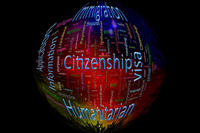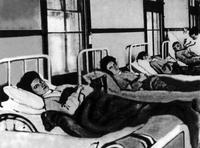-
Arab Spring protests an isolated occurrence, not new Arab world trend

As the long-term impact of the Arab Spring continues to take shape, researchers warn that the protests that swept across the Middle East and North Africa could mark more of an isolated occurrence than a permanent rise of people power in the region.
-
-
Why some immigrants get citizenship

For immigrants, the path to citizenship in many countries is filled with hurdles: finding a job, learning the language, passing exams. For some people, however, the biggest obstacle of all may be one they cannot help: their country of origin.
-
-
Conflicting cultural identities foster political radicalism
New research suggests that dual-identity immigrants — first-generation immigrants and their descendants who identify with both their cultural minority group and the society they now live in — may be more prone to political radicalism if they perceive their two cultural identities to be incompatible.
-
-
Social media helped but did not cause Arab Spring

Social psychological research has concluded that social media accelerated but did not cause the Arab Spring uprisings in Tunisia and Egypt.
-
-
Broader background checks, denial criteria may help prevent mass-shooting catastrophes
Garen Wintemute, a leading authority on gun violence prevention and an emergency medicine physician at the University of California, Davis, believes broader criteria for background checks and denials on gun purchases can help prevent future firearm violence, including mass shooting catastrophes such as those that occurred at Sandy Hook, Aurora, Virginia Tech, and Columbine
-
-
What we know, and what we can do, about school shootings
Since the early 1970s, school shootings at American elementary, secondary, and higher education institutions have been a painful reality for American society; after each incident — like the recent attack in Newtown, Connecticut — there is voluminous dialogue about what can be done to prevent the next such tragedy; a new study explores what we have learned about these tragic incidents, and what can be done to prevent them
-
-
Connection between goth subculture, mass shootings appears tenuous

Classmates of the otherwise bland and elusive Adam Lanza, who last Friday killed twenty children and six adults at the Sandy Hook school in Newton, Connecticut, described him as “goth”; is there a “goth” connection in the Newtown school shooting? The question is asked because news reports have connected several perpetrators of both mass shooting and killing on a smaller scale to goth culture; a closer examination shows that the relationship between goth and mass shooting is tenuous
-
-
NRA shuts down Facebook page in wake of Connecticut shooting
In the immediate aftermath of the Newtown shooting, the National Rifle Association (NRA) has deactivated its Facebook page, just one week after celebrating the fact that it has gathered 1.7 million “likes” on the page; the debate about whether the United States needs stricter gun controls continues, though
-
-
Increase in negative messages about Muslims in the media: study

Organizations using fear and anger to spread negative messages about Muslims have moved from the fringes of public discourse into the mainstream media since the 9/ 11 attacks; to reach these conclusions, a University of North Carolina sociologist used textual detection software to track the influence of 1,084 press releases about Muslims from 120 organizations on more than 50,000 television transcripts and newspaper articles produced from 2001 to 2008
-
-
Why typhoid fever pathogen targets only humans

Salmonella typhiis a particularly nasty bacterium that targets only humans and causes typhoid fever, which kills hundreds of thousands of people annually; scientists explain how evolution shaped the pathogen to be so selective
-
-
“Black swans” and “perfect storms” are often lame excuses for bad risk management
The terms “black swan” and “perfect storm” have become part of public vocabulary for describing disasters ranging from the 2008 meltdown in the financial sector to the terrorist attacks of 9/11, but some argue that people in government and industry are using these terms too liberally in the aftermath of a disaster as an excuse for poor planning
-
-
Evidence suggests that three-strikes law does not deter crime
Contrary to what police, politicians, and the public believe about the effectiveness of California’s three-strikes law, researchers have found that the get-tough-on-criminals policy voters approved in 1994 has done nothing to reduce the crime rate; a criminologist finds that decline in alcohol consumption is most responsible for decreasing crime rate
-
-
The negative effects of increasing computerized surveillance

To understand the effects of continuous computerized surveillance on individuals, Finnish researchers equipped ten Finnish households with video cameras, microphones, and logging software for personal computers, wireless networks, smartphones, TVs, and DVDs – then followed what happened
-
-
The historical and future probabilities of 9/11-size terrorist events
On the eleventh anniversary of the 9/11 attacks, two statisticians apply statistical methods to try and accurately estimate the probability of a 9/11-size terrorist attack occurring during the next decade; examining the historical data from 1968 to 2007, they show that the likelihood of a 9/11-size attack occurring within this time frame was between 11 and 35 percent; looking forward, the likelihood increase to between 25 and 50 percent – and, under certain circumstances, to 95 percent
-
-
Men in maritime disasters save themselves first --“women and children first” is a myth

Since the sinking of the Titanic, there has been a widespread belief that the social norm of “women and children first” gives women a survival advantage over men in maritime disasters, and that captains and crew members give priority to passengers; a new study find that the Titanic disaster, in which 70 percent of the women and children on board were saved compared to 20 percent of the men, is a glaring exception to the rule; during maritime disasters, men use their relative strength to save themselves; what is more, studies of human behavior during natural disasters show the same results: in life-and-death situations, it is every man for himself
-
- All
- Regional
- Water
- Biometrics
- Borders/Immig
- Business
- Cybersecurity
- Detection
- Disasters
- Government
- Infrastructure
- International
- Public health
- Public Safety
- Communication interoperabillity
- Emergency services
- Emergency medical services
- Fire
- First response
- IEDs
- Law Enforcement
- Law Enforcement Technology
- Military technology
- Nonlethal weapons
- Nuclear weapons
- Personal protection equipment
- Police
- Notification /alert systems
- Situational awareness
- Weapons systems
- Sci-Tech
- Sector Reports
- Surveillance
- Transportation
Advertising & Marketing: advertise@newswirepubs.com
Editorial: editor@newswirepubs.com
General: info@newswirepubs.com
2010-2011 © News Wire Publications, LLC News Wire Publications, LLC
220 Old Country Road | Suite 200 | Mineola | New York | 11501
Permissions and Policies
Editorial: editor@newswirepubs.com
General: info@newswirepubs.com
2010-2011 © News Wire Publications, LLC News Wire Publications, LLC
220 Old Country Road | Suite 200 | Mineola | New York | 11501
Permissions and Policies
